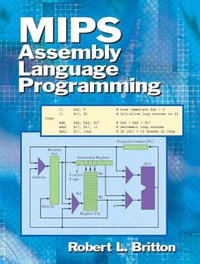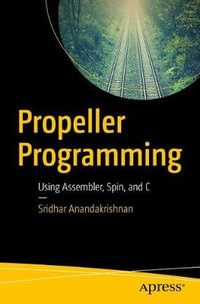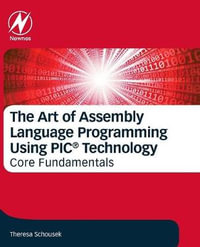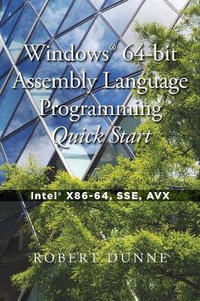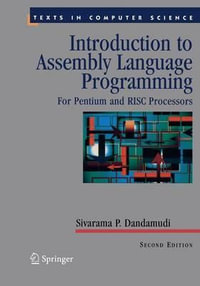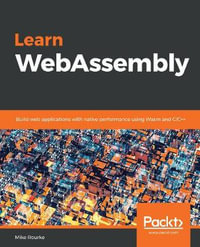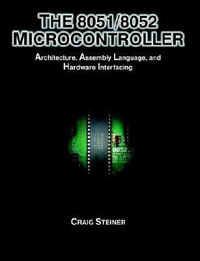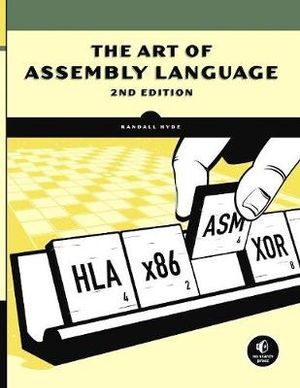
The Art of Assembly Language, 2nd Edition
By: Randall Hyde
Paperback | 3 January 2010 | Edition Number 2
Sorry, we are not able to source the book you are looking for right now.
We did a search for other books with a similar title, however there were no matches. You can try selecting from a similar category, click on the author's name, or use the search box above to find your book.
Since 1996, Randall Hyde's The Art of Assembly Language has provided a comprehensive, plain-English, and patient introduction to 32-bit x86 assembly for non-assembly programmers. Hyde's primary teaching tool, High Level Assembler (or HLA), incorporates many of the features found in high-level languages (like C, C++, and Java) to help you quickly grasp basic assembly concepts. HLA lets you write true low-level code while enjoying the benefits of high-level language programming.
As you read The Art of Assembly Language, you'll learn the low-level theory fundamental to computer science and turn that understanding into real, functional code.
You'll learn how to-
-Edit, compile, and run HLA programs
-Declare and use constants, scalar variables, pointers, arrays, structures, unions, and namespaces
-Translate arithmetic expressions (integer and floating point)
-Convert high-level control structures
This much anticipated second edition of The Art of Assembly Language has been updated to reflect recent changes to HLA and to support Linux, Mac OS X, and FreeBSD. Whether you're new to programming or you have experience with high-level languages, The Art of Assembly Language, 2nd Edition is your essential guide to learning this complex, low-level language.
Assembly is a low-level programming language that's one step above a computer's native machine language. Although assembly language is commonly used for writing device drivers, emulators, and video games, many programmers find its somewhat unfriendly syntax intimidating to learn and use.
Since 1996, Randall Hyde's The Art of Assembly Language has provided a comprehensive, plain-English, and patient introduction to 32-bit x86 assembly for non-assembly programmers. Hyde's primary teaching tool, High Level Assembler (or HLA), incorporates many of the features found in high-level languages (like C, C++, and Java) to help you quickly grasp basic assembly concepts. HLA lets you write true low-level code while enjoying the benefits of high-level language programming.
As you read The Art of Assembly Language, you'll learn the low-level theory fundamental to computer science and turn that understanding into real, functional code.
You'll learn how to-
-Edit, compile, and run HLA programs
-Declare and use constants, scalar variables, pointers, arrays, structures, unions, and namespaces
-Translate arithmetic expressions (integer and floating point)
-Convert high-level control structures
This much anticipated second edition of The Art of Assembly Language has been updated to reflect recent changes to HLA and to support Linux, Mac OS X, and FreeBSD. Whether you're new to programming or you have experience with high-level languages, The Art of Assembly Language, 2nd Edition is your essential guide to learning this complex, low-level language.
| Praise For The First Edition Of The Art Of Assembly Language | |
| Acknowledgments | |
| Hello, World Of Assembly Language | |
| The Anatomy of an HLA Program | |
| Running Your First HLA Program | |
| Some Basic HLA Data Declarations | |
| Boolean Values | |
| Character Values | |
| An Introduction to the Intel 80x86 CPU Family | |
| The Memory Subsystem | |
| Some Basic Machine Instructions | |
| Some Basic HLA Control Structures | |
| Introduction to the HLA Standard Library | |
| Additional Details About try..endtry | |
| High-Level Assembly Language vs. Low-Level Assembly Language | |
| For More Information; | |
| Data Representation | |
| Numbering Systems | |
| The Hexadecimal Numbering System | |
| Data Organization | |
| Arithmetic Operations on Binary and Hexadecimal Numbers | |
| A Note About Numbers vs. Representation | |
| Logical Operations on Bits | |
| Logical Operations on Binary Numbers and Bit Strings | |
| Signed and Unsigned Numbers | |
| Sign Extension, Zero Extension, Contraction, and Saturation | |
| Shifts and Rotates | |
| Bit Fields and Packed Data | |
| An Introduction to Floating-Point Arithmetic | |
| Binary-Coded Decimal Representation | |
| Characters | |
| The Unicode Character Set | |
| For More Information; | |
| Memory Access And Organization | |
| The 80x86 Addressing Modes | |
| Runtime Memory Organization | |
| How HLA Allocates Memory for Variables | |
| HLA Support for Data Alignment | |
| Address Expressions | |
| Type Coercion | |
| Register Type Coercion | |
| The stack Segment and the push and pop Instructions | |
| The Stack Is a LIFO Data Structure | |
| Accessing Data You've Pushed onto the Stack Without Popping It | |
| Dynamic Memory Allocation and the Heap Segment | |
| The inc and dec Instructions | |
| Obtaining the Address of a Memory Object | |
| For More Information; | |
| Constants, Variables, And Data Types | |
| Some Additional Instructions: intmul, bound, into | |
| HLA Constant and Value Declarations | |
| The HLA Type Section | |
| enum and HLA Enumerated Data Types | |
| Pointer Data Types | |
| Composite Data Types | |
| Character Strings | |
| HLA Strings | |
| Accessing the Characters Within a String | |
| The HLA String Module and Other String-Related Routines | |
| In-Memory Conversions | |
| Character Sets | |
| Character Set Implementation in HLA | |
| HLA Character Set Constants and Character Set Expressions | |
| Character Set Support in the HLA Standard Library | |
| Using Character Sets in Your HLA Programs | |
| Arrays | |
| Declaring Arrays in Your HLA Programs | |
| HLA Array Constants | |
| Accessing Elements of a Single-Dimensional Array | |
| Sorting an Array of Values | |
| Multidimensional Arrays | |
| Allocating Storage for Multidimensional Arrays | |
| Accessing Multidimensional Array Elements in Assembly Language | |
| Records | |
| Record Constants | |
| Arrays of Records | |
| Arrays/Records as Record Fields | |
| Aligning Fields Within a Record | |
| Pointers to Records | |
| Unions | |
| Anonymous Unions | |
| Variant Types | |
| Namespaces | |
| Dynamic Arrays in Assembly Language | |
| For More Information; | |
| Procedures And Units | |
| Procedures | |
| Saving the State of the Machine | |
| Prematurely Returning from a Procedure | |
| Local Variables | |
| Other Local and Global Symbol Types | |
| Parameters | |
| Functions and Function Results | |
| Recursion | |
| Forward Procedures | |
| HLA v2.0 Procedure Declarations | |
| Low-Level Procedures and the call Instruction | |
| Procedures and the Stack | |
| Activation Records | |
| The Standard Entry Sequence | |
| The Standard Exit Sequence | |
| Low-Level Implementation of Automatic (Local) Variables | |
| Low-Level Parameter Implementation | |
| Procedure Pointers | |
| Procedural Parameters | |
| Untyped Reference Parameters | |
| Managing Large Programs | |
| The #include Directive | |
| Ignoring Duplicate #include Operations | |
| Units and the external Directive | |
| Namespace Pollution | |
| For More Information; | |
| Arithmetic | |
| 80x86 Integer Arithmetic Instructions | |
| Arithmetic Expressions | |
| Logical (Boolean) Expressions | |
| Machine and Arithmetic Idioms | |
| Floating-Point Arithmetic | |
| Converting Floating-Point Expressions to Assembly Langggggguage | |
| HLA Standard Library Support for Floating-Point Arithmetic | |
| For More Information; | |
| Low-Level Control Structures | |
| Low-Level Control Structures | |
| Statement Labels | |
| Unconditional Transfer of Control (jmp) | |
| The Conditional Jump Instructions | |
| öMedium-Levelö Control Structures: jt and jf | |
| Implementing Common Control Structures in Assembly Language | |
| Introduction to Decisions | |
| State Machines and Indirect Jumps | |
| Spaghetti Code | |
| Loops | |
| Performance Improvements | |
| Hybrid Control Structures in HLA | |
| For More Information; | |
| Advanced Arithmetic | |
| Multiprecision Operations | |
| Operating on Different-Size Operands | |
| Decimal Arithmetic | |
| Tables | |
| For More Information; | |
| Macros And The Hla Compile-Time Language | |
| Introduction to the Compile-Time Language (CTL) | |
| The #print and #error Statements | |
| Compile-Time Constants and Variables | |
| Compile-Time Expressions and Operators | |
| Compile-Time Functions | |
| Conditional Compilation (Compile-Time Decisions) | |
| Repetitive Compilation (Compile-Time Loops) | |
| Macros (Compile-Time Procedures) | |
| Writing Compile-Time ôProgramsö | |
| Using Macros in Different Source Files | |
| For More Information; | |
| Bit Manipulation | |
| What Is Bit Data, Anyway? | |
| Instructions That Manipulate Bits | |
| The Carry Flag as a Bit Accumulator | |
| Packing and Unpacking Bit Strings | |
| Coalescing Bit Sets and Distributing Bit Strings | |
| Packed Arrays of Bit Strings | |
| Searching for a Bit | |
| Counting Bits | |
| Reversing a Bit String | |
| Merging Bit Strings | |
| Extracting Bit Strings | |
| Searching for a Bit Pattern | |
| The HLA Standard Library Bits Module | |
| For More Information; | |
| The String Instructions | |
| The 80x86 String Instructions | |
| Performance of the 80x86 String Instructions | |
| For More Information; | |
| Classes And Objects | |
| General Principles | |
| Classes in HLA | |
| Objects | |
| Inheritance | |
| Overriding | |
| Virtual Methods vs. Static Procedures | |
| Writing Class Methods and Procedures | |
| Object Implementation | |
| Constructors and Object Initialization | |
| Destructors | |
| HLA's _initialize_ and _finalize_ Strings | |
| Abstract Methods | |
| Runtime Type Information | |
| Calling Base Class Methods | |
| For More Information | |
| Ascii Character Set | |
| Colophon | |
| Updates | |
| Table of Contents provided by Publisher. All Rights Reserved. |
ISBN: 9781593272074
ISBN-10: 1593272073
Series: NO STARCH PRESS
Published: 3rd January 2010
Format: Paperback
Language: English
Number of Pages: 768
Audience: General Adult
Publisher: RANDOM HOUSE US
Country of Publication: GB
Edition Number: 2
Dimensions (cm): 23.4 x 17.8 x 4.6
Weight (kg): 1.46
Shipping
| Standard Shipping | Express Shipping | |
|---|---|---|
| Metro postcodes: | $9.99 | $14.95 |
| Regional postcodes: | $9.99 | $14.95 |
| Rural postcodes: | $9.99 | $14.95 |
How to return your order
At Booktopia, we offer hassle-free returns in accordance with our returns policy. If you wish to return an item, please get in touch with Booktopia Customer Care.
Additional postage charges may be applicable.
Defective items
If there is a problem with any of the items received for your order then the Booktopia Customer Care team is ready to assist you.
For more info please visit our Help Centre.
You Can Find This Book In
This product is categorised by
- Non-FictionComputing & I.T.Computer Programming & Software DevelopmentProgramming & Scripting Languages
- Non-FictionComputing & I.T.Computer ScienceComputer Architecture & Logic DesignAssembly Languages
- Non-FictionComputing & I.T.Computer Science
- Non-FictionComputing & I.T.Computer Programming & Software Development




